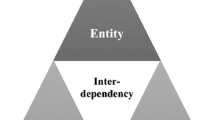Abstract
The starting point of the investigation is the correspondence between the term and concept of Ego (“I”) and the various types of experience. Two main ways of introducing and applying of the term “I” (Ego) in Russian philosophy are investigated from the semantic-analytical point of view. The first takes the Ego as initially existed either as a spiritual substance or a given form uniting experiences. This way of treating is realized in L. Lopatin’s and V. Soloviev’s philosophical teachings. The second containing some moments of reflexion on the concept treated the Ego as a result of experience. It was developed in M. Karinskij und G. Špet. In context of difference between the Ego and the subject or consciousness the question of the owner of consciousness is considered.
Similar content being viewed by others
Notes
In an analytical effort to avoid substantiation of the fairly substantiated term Ego it is advisable to write about the conceptions of consciousness, cognition, activity, etc. in which the Ego assumes different meanings rather than of the conceptions of the Ego.
References
Husserl, E. (1970). Logical investigation (Logische Untersuchungen) (Vol. II, V Investigation, § 12). London: Routledge & Kegan Paul.
Karinskij, M. I. (1998). Javlenie i dejstvitelnost’. In Antologija fenomenologičeskoj filosofii v Rossii, Moscow (pp. 27–58) and in the first edition: Pravoslavnoe obozrenie, 1878, 1(5), 659–704.
Lopatin, L. M. (1886). Položitelnye zadači filosofii (Tom 1). Moskva.
Molchanov, V. (2007). Sub’’ektivizm - interpretacii i analiz opyta. K kantovskoj eksplikacii apriorizma. In Immanuel Kant. Nasledie i proekt (pp. 135–152). Moscow: Kanon.
Molchanov, V. (2008). Deutungssubjektivismus und Erfahrungsanalyse. Zu Kants Apriorismus-Explikation. In Kant im Spiegel der Russischen Kantforschung Heute (pp. 87–103). Stuttgart: Frommann-Holzboog.
Solov’ëv, V. S. (1988). Sočinenija v dvukh tomakh (Tom. 1). Moscow: Nauka.
Špet, G. G. (2006). Philosophia Natalis. Izbrannye psikhologo-pedagogičeskie trudy. Moscow: Rosspen.
Author information
Authors and Affiliations
Corresponding author
Rights and permissions
About this article
Cite this article
Molchanov, V. The Ego: the problem and the term as treated by Russian philosophy. Stud East Eur Thought 61, 181–188 (2009). https://doi.org/10.1007/s11212-009-9073-3
Published:
Issue Date:
DOI: https://doi.org/10.1007/s11212-009-9073-3




